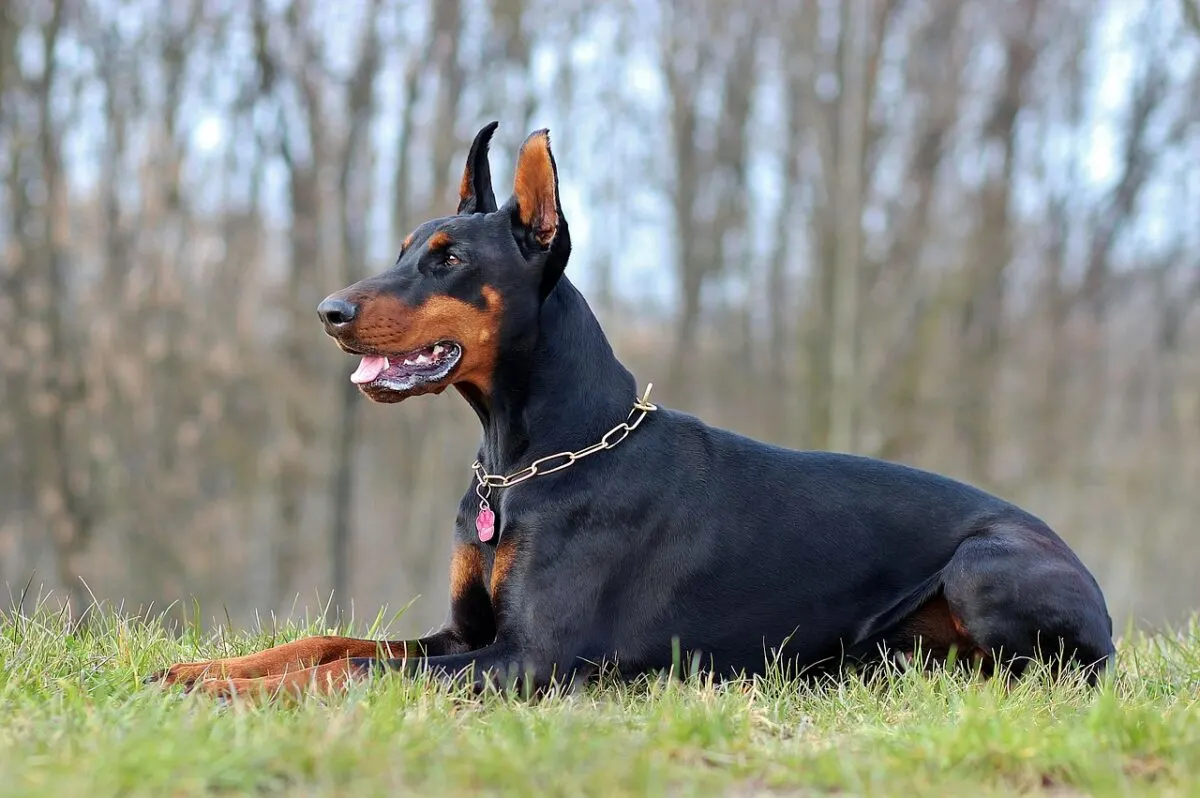Doberman Pinschers, often called Dobermans, are a popular breed of dog known for their sleek appearance and fierce loyalty to their owners. Let’s get to know them.
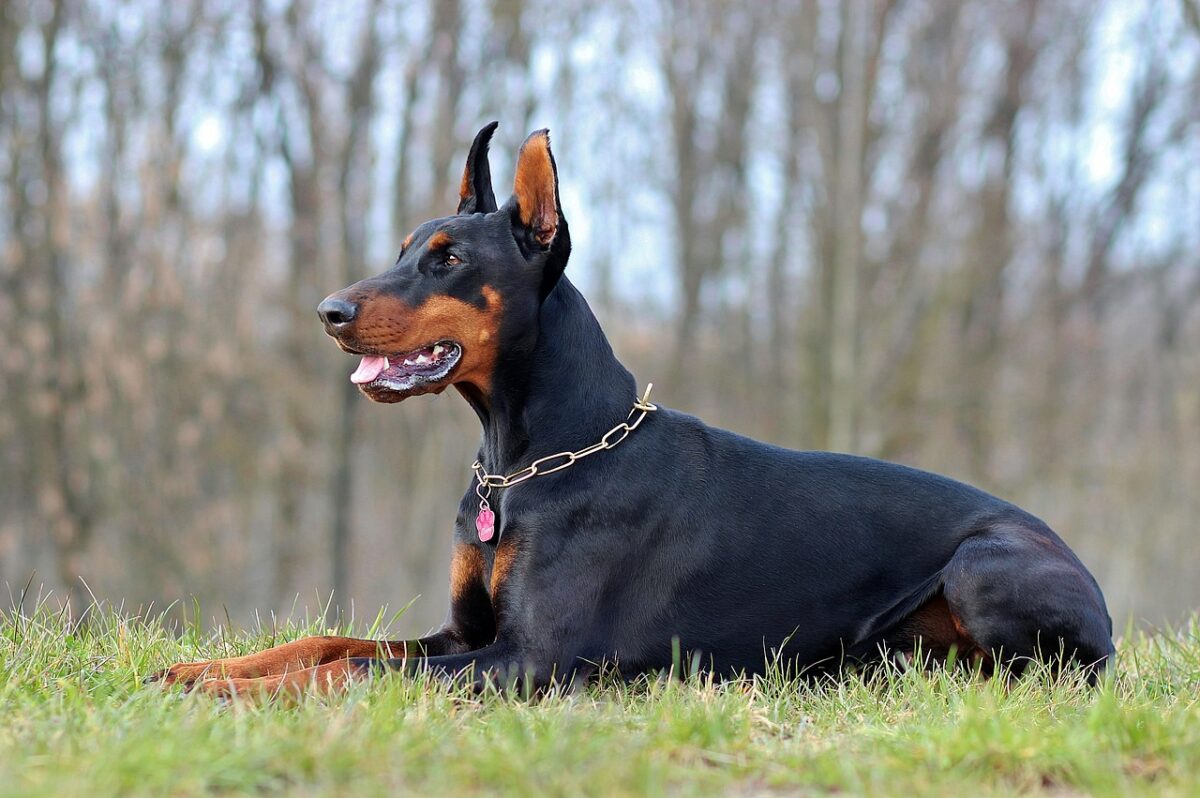
They have captured the hearts of many dog lovers around the world. Originally bred in the 19th century by a German tax collector named Karl Friedrich Louis Dobermann, the Doberman Pinscher was designed to be a guard dog that could protect its owner from harm.
Over time, the breed has evolved into a versatile working dog. It is now being used for various purposes, such as police and military dogs and search- and rescue-animals.
We will discuss the physical characteristics, temperament, and health concerns of Doberman Pinschers, as well as what potential owners should consider before bringing one of these dogs into their homes.
Jump ahead to any section below:
Physical Characteristics
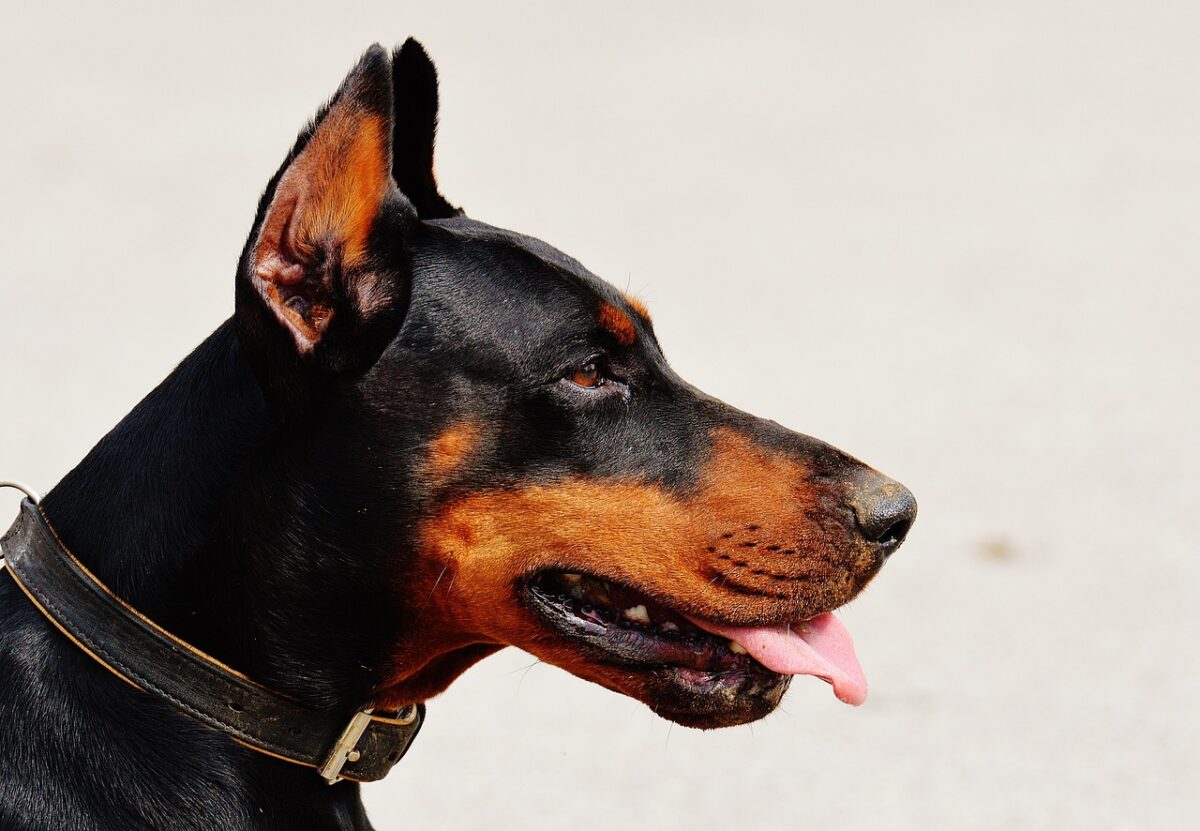
Doberman Pinschers are categorized as medium to large-sized dogs and have a height ranging from 24 to 28 inches at the withers. They generally weigh between 60 to 100 pounds. Males tend to be larger than females, with a weight range of 75 to 100 pounds, while females weigh between 60 to 90 pounds.
Doberman Pinschers have short, smooth coats that lie close to their skin. They come in four standard colors: black, blue, red, and fawn. Some Dobermans have tan markings on their face, chest, legs, and tail.
These impressive dogs have sleek, muscular builds, deep chests, and broad backs. Their legs are long and straight, giving them a confident and agile gait. Additionally, their tail is often docked to a short length.
A comment from one of our editors with regards to tail docking and ear cropping in dogs: “Tail docking and ear cropping legal in almost all states in America, but illegal in many parts of Europe and South Africa. Thus a doberman might look a little different in America vs. one in Germany. In countries where this practice is illegal unfortunately some owners or breeders take it upon themselves to dock tails and crop ears which raises health and wellbeing concerns for the animal. This procedure, in countries where it is legal, is performed by a veterinarian with anesthetic and strict sterile operating protocols. It is important to check this law because in countries where this practice is illegal a dog that has had its tail docked and ears cropped is usually not allowed to register with the breed society or attend dog shows.
Doberman Pinschers have a distinctive head shape, a long, wedge-shaped muzzle, and a strong jaw. Their ears are naturally floppy, but they are often cropped to stand erect, which gives them an alert and imposing appearance.
Common Health Issues
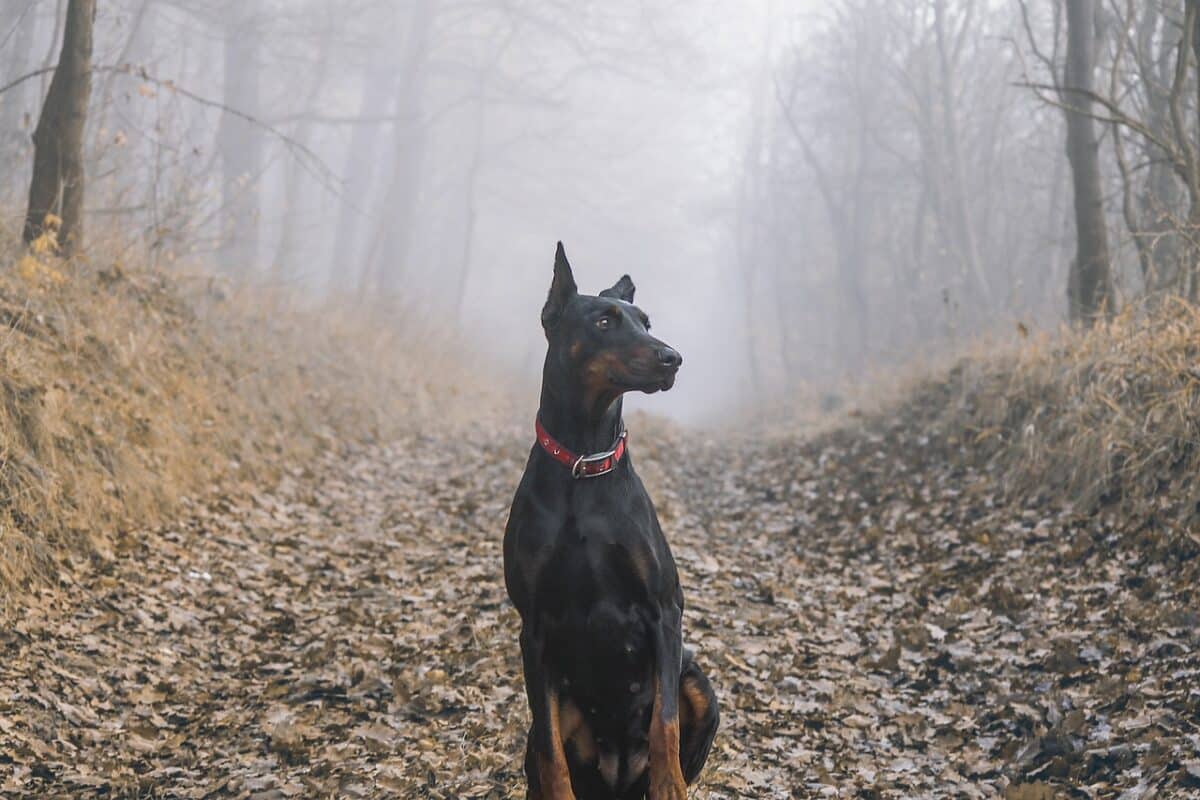
Doberman Pinschers are a breed of dog that requires responsible ownership and proper healthcare to maintain their health and well-being.
#1 Dilated cardiomyopathy (DMC)
Dilated cardiomyopathy is a heart condition that causes the heart muscle to become weak, leading to poor blood circulation and heart failure. Sadly, Dobermans are predisposed to this condition, and it is recommended that owners have their dogs screened for DCM using an echocardiogram.
#2 Hip dysplasia
Hip dysplasia is a hereditary ailment that results in pain and discomfort by impacting the hip joint. Dobermans can be prone to this condition as well, so it is crucial to have them screened for hip dysplasia before breeding.
#3 Von Willebrand’s Disease
Von Willebrand’s Disease is a condition that causes bleeding abnormalities in both humans and canines. Dobermans are one of the breeds that are predisposed to this condition. Consequently, having your Doberman screened for VWD before any surgical procedures is essential.
#4 Cancer
They are moreover susceptible to specific forms of cancer, including lymphoma, osteosarcoma, and hemangiosarcoma. Be vigilant for signs of cancer in your Doberman, such as lumps, bumps, and changes in behavior.
#5 Hypothyroidism
Hypothyroidism is a medical condition characterized by reduced hormone production in the thyroid gland, leading to symptoms such as weight gain, lethargy, and skin problems. Hypothyroidism is another common ailment that affects Doberman Pinschers. The treatment for this ailment is Hormone Replacement Therapy.
Lifespan
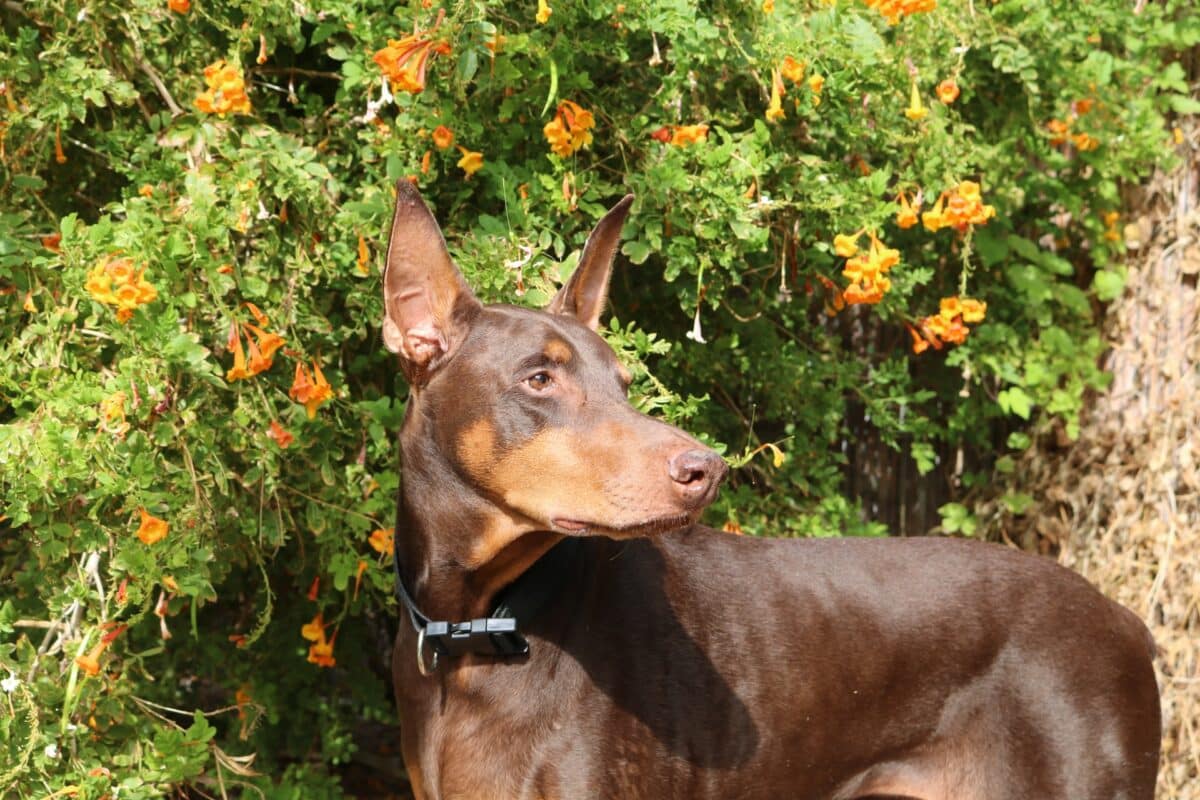
In general, the lifespan of Doberman Pinschers ranges from 10 to 12 years. Nonetheless, with adequate healthcare, it is possible for certain Dobermans to live well into their late teens. Maintaining a healthy lifestyle for your Doberman is essential, including regular exercise, a balanced diet, and routine veterinary care.
Health Considerations for Doberman Owners

To maintain their health and well-being, Doberman Pinschers need to have a well-balanced diet. Providing your Doberman with high-quality dog food is vital. Feeding your Doberman to much human food can lead to health issues.
Regular exercise is essential for Doberman Pinschers. They are a high-energy breed that can develop boredom and destructive behavior without adequate physical activity. Providing at least 30 minutes of daily exercise, which can include walks, runs, and playtime, is recommended for Doberman owners.
Preventative healthcare is essential for the overall health and well-being of your Doberman. This includes routine veterinary care, vaccinations, parasite prevention, and regular dental care.
For the behavior as well as the temperament of your Doberman, proper training is necessary. It is recommended that owners enroll their Dobermans in obedience training classes. You also need to expose them to various environments and social situations from a young age.
Doberman Pinschers are sensitive to extreme temperatures, both hot and cold. Providing your Doberman with a comfortable and safe living environment, including access to fresh water and shelter, is essential. Dobermans are not well-suited to living outdoors or in a kennel environment, as they thrive on human interaction and attention. If you want a Doberman for your family, you must ready yourself to provide them with a comfortable and safe living environment inside your home.
Grooming
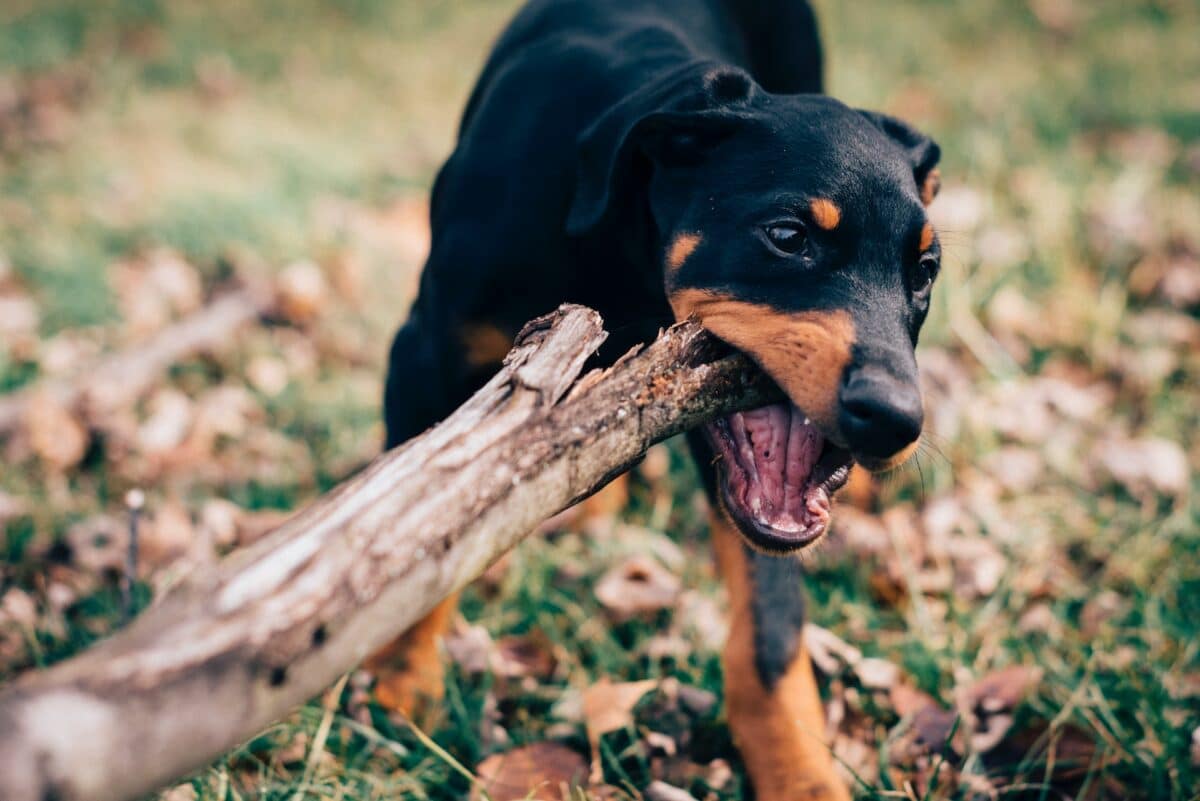
Doberman Pinschers have a short and smooth coat that requires very minimal grooming. It’s sufficient to brush them once a week with the use of a soft-bristled brush to remove loose fur and dirt. Note that Dobermans do not require frequent bathing, and over-bathing them can result in stripping their coat of natural oils.
Diet
To ensure their dietary needs are met, owners should provide high-quality dog food. It needs to be appropriate for the dog’s age, weight, and activity level.
Since Dobermans are an active breed, their diet should be rich in protein and fat to support their high-energy needs. It is vital to keep an eye on their weight and make adjustments to their diet accordingly to prevent obesity.
Overfeeding and insufficient exercise can lead to obesity, which in turn contributes to health problems such as diabetes and joint issues. Hence, maintaining a healthy diet and regular exercise routine is essential for the overall health of Doberman Pinschers.
Key Points
| 1. | Doberman Pinschers are medium to large-sized dogs, standing between 24 to 28 inches tall at the shoulder and weighing between 60 to 100 pounds. Males tend to be larger than females, with a weight range of 75 to 100 pounds, while females weigh between 60 to 90 pounds. |
| 2. | The average lifespan of a Doberman Pinscher is between 10 and 12 years. However, with proper healthcare, some Dobermans have been known to live into their late teens. |
| 4. | Doberman Pinschers are highly intelligent and trainable dogs, but they require early socialization and training to prevent behavioral issues. They are a breed that is highly sensitive to their surroundings and can become anxious or aggressive without proper socialization. |
| 5. | Doberman Pinschers are a breed of dog that requires responsible ownership and proper healthcare to maintain their health and wellbeing. |
Wrapping Up

In conclusion, Doberman Pinschers are a fascinating and unique dog breed that requires careful consideration before being welcomed into your home. Proper care, attention, and training are essential to ensuring that your Doberman remains happy and healthy throughout its life.
In case you are thinking about adding a Doberman to your family, it is crucial to conduct thorough research and take all factors into careful consideration. If you can provide responsible ownership, a Doberman can become a faithful and affectionate companion who will bring happiness and companionship to your life for several years to come.
Thank you for reading this article! If this doggo wasn’t up your alley, or if you simply want to learn more about canines, read our post on Dog Breeds That Begin With S.
- Octopus Stuck to Diver’s Back and Won’t Come Off - April 25, 2024
- Magpie Bird Is Reunited with Her Dog Best Friend - April 24, 2024
- Dog Saves Another Dog From Drowning in Fish Pond - April 23, 2024

